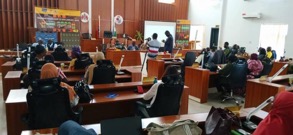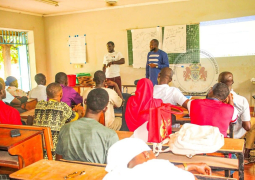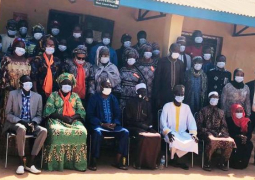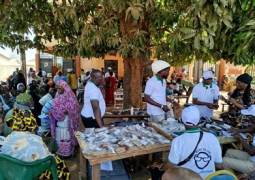
The training was facilitated by a collaborative partnership between KMC, the Gambia Women’s Chamber of Commerce (GWCC), and the Metropolitan Area of Barcelona.
Funded by the European Union, this three-year grant aims to enhance the capabilities of local Civil Society Organisations (CSOs) in engaging in policy dialogue and implementing sustainable development initiatives. The focus will be on vital areas such as the circular economy, recycling, and sustainable agro-ecological practices, particularly in the use of organic fertilisers.
Paa Sait Ceesay, the Chief Executive Officer of KMC, expressed his excitement about partnering on this project, which aims to significantly reduce waste disposal costs. Notably, 60% of the revenue generated by the council is reinvested into enhancing waste collection efforts.
"We spend nearly D190,000 weekly on fuel for our 19 vehicles. This amounts to a staggering D760,000 in fuel expenses per month for each ward. It's important to note that this figure accounts solely for fuel costs," he clarified.
CEO Njie highlighted that these expenses exclude maintenance, tyre purchases, and other associated costs. He pointed out that the salaries for the staff managing the 19 trucks approach D2 million each month, while the total maintenance expenses for waste collection alone nearly hit D8 million per month.
"We can greatly optimize expenses related to waste management through essential workshops and collaboration. At present, the council allocates D500,000 every 10 days to monitor dump sites. Ceesay emphasised that ‘if we truly commit to these training sessions, we can shift our focus to more pressing priorities."
Lamin S. Sanyang, the KMC Director of Services, emphasised that for the past five years, KMC has been engaging in a fruitful partnership with Mbolo and the Metropolitan Area of Barcelona (AMB) on pioneering the Zero Waste project.
He underscored the significance of the collaboration with GWCC, stressing that successful waste management hinges on the proactive engagement of the private sector, as well as the integration of women's viewpoints and a gender perspective into the initiative.
The project aims to enhance the re-circulation of all waste throughout the food supply chain in The Gambia.
Sanyang underscored that this initiative will result in the establishment of KMC’s first mechanical compost plant capable of processing a substantial amount of organic waste.
"We will also collaborate with the Ministry of Agriculture. For more than 50 years, our reliance on chemical fertilizers has severely impacted soil health, resulting in diminished harvests and production. By implementing mechanical composting at our facility in Bakau, we will generate organic waste that will improve our agricultural practices," he stated.
He mentioned that annually, the women of Bakau spend about D50,000 on organic fertiliser, which is currently transported with the support of the government.
"The initiative seeks to divert farmers from using chemical fertilizers and promote the production of high-quality organic waste. Collaborating with the Bureau of Statistics is crucial to guarantee that farmers receive top-grade organic waste."
"This project is more substantial than it initially seems, holding significant potential for impact. Successful collaboration will necessitate funding contributions from both KMC and GWCC," he elaborated.
Silvia Liopart, the Project Coordinator, announced that they are gathering organic waste from markets across The Gambia to transform it into compost, promoting sustainable agro-ecological practices.
“Since 2019, we have collaborated with KMC and AMB to implement and evaluate organic waste collection at ‘Marche-Ngelew.’ However, we faced challenges with waste separation.”
"During a recent trade fair, we successfully gathered over two tonnes of organic waste from 65 vendors, with less than 2% being non-organic. The feedback we received highlighted that the fair was clean and odour-free, showcasing the project's tremendous potential," she stated.
Ms. Liopart highlighted that AMB invited Mr. Victor Midans, the head of waste prevention and planning for the Metropolitan Area of Barcelona, to impart valuable insights on waste management principles and the circular economy.
“With three decades of expertise, Mr. Midans has been a pivotal champion for revolutionizing waste management in Catalonia, transforming the perception of waste from a mere cleaning service to a valuable resource.”
"For the last seven years, he has spearheaded waste management initiatives at AMB, orchestrating efforts across 32 municipalities to advance efficient and sustainable waste management practices," she elaborated.
Read Other Articles In National News

MoBSE trains 20 new Itinerant teachers to support inclusive education
Sep 23, 2025, 11:36 AM




